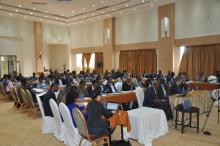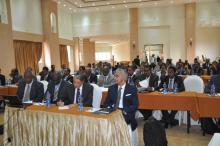Stakeholders Agree on the National Strategy and Plan of Action 2015-2025 for Pharmaceutical Manufacturing Development in Ethiopia
2 JUN 2015 | ADDIS ABABA - A national stakeholder’s workshop was held today to validate the National Strategy and Plan of Action for Pharmaceutical Manufacturing Development in Ethiopia.
This landmark workshop was co-chaired by Dr Kebede Worku, State Minister of Health, and Dr Mebrahtu Meles, State Minister of Industry with the participation of the World Health Organization (WHO), the United Nations Industrial Development Organization (UNIDO), the African Union Commission, Joint United Nations Program on HIV/AIDS (UNAIDS), African Development Bank, China, United Nations Children’s Fund (UNICEF), United Nations Population Fund (UNFPA), ANDI and key government and private sector partners.
“WHO has been providing technical and financial support to the strategy development process,” said Dr Pierre M’Pele, Head of WHO in Ethiopia at the opening session, and urged stakeholders to actively participate to ensure a strong, comprehensive strategy and plan of action that will contribute to the ambitious target of Ethiopia becoming a middle-income country by 2025.
The pharmaceutical manufacturing development in Ethiopia is a visionary program of action, which – if implemented from a value chain perspective in a committed and sustained manner by making the required investments and forging strategic partnerships – can transform the pharmaceutical sector in the country over the next 10 years.
The national strategy and its plan of action can contribute hugely to improving access of the Ethiopian people to locally produced safe, effective and quality-assured essential medicines.
Dr Kebede Worku, State Minister of Health, recalled that adequate production, quality of products and access to medicine contributes to better outcomes, urging local pharmaceutical manufacturers to work aggressively towards meeting the WHO Good Manufacturing Practice (GMP) roadmap targets and to adhere to the steps outlined in the strategic document.
The national strategy is aligned and harmonized with the next five years’ Health Sector Transformation Plan and the Growth and Transformation Plan (GTP II) to enhance the capacity of manufacturers towards ensuring supply of affordable and quality medicines to the local and regional markets, including the competitive international market.
Dr Mebrahtu Meles, State Minister of Industry, confirmed the strong commitment of the Ministry of Industry to lead the implementation of the national strategy and plan of action in collaboration with Ministry of Health, WHO and all other partners.
The Ethiopian national strategy and plan of action is in line with The African Union Pharmaceutical Manufacturing Plan for Africa, which aims to accelerate the development of African the pharmaceutical manufacturing industry towards the desired compelling and non-negotiable goals despite the long and challenging journey ahead. This is one of the reasons Ethiopia is working hard to make it happen.
Today’s workshop is a landmark step towards strengthening Ethiopia’s pharmaceutical manufacturing sub-sector, and equipping it to meet the GMP roadmap targets.
This important step is a landmark not only for Ethiopia, but also for Africa. The Ethiopian national strategy and plan of action is in line with The African Union Pharmaceutical Manufacturing Plan for Africa, which aims to accelerate the development of African the pharmaceutical manufacturing industry towards the desired compelling and non-negotiable goals despite the long and challenging journey ahead.
For more information, please contact
Abraham Gebregiorgis
Essential Drugs and Medicines
WHO Ethiopia
Email: %20gebregiorgisa [at] who.int (gebregiorgisa[at]who[dot]int)
Tel: (+251) 913 53 9763
or
Loza Mesfin Tesfaye
Communications, Advocacy and Media
WHO Ethiopia
Email: %20tesfayel [at] who.int (tesfayel[at]who[dot]int)
Tel: (+251) 911 144 194
Photo: WHO Ethiopia/Loza M.







